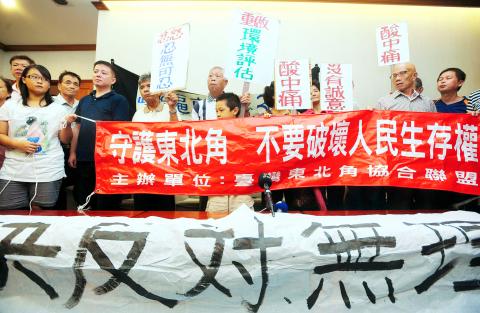Vowing to protect their land, dozens of residents from New Taipei City’s (新北市) Gongliao District (貢寮) yesterday protested a government land seizure plan to make room for a development project in the coastal area.
“We, the people of Gongliao, have lived there for hundreds, or even thousands of years as the indigenous Ketagalan tribe — we are not giving up the land that’s been passed down from our ancestors,” Lin Sheng-yi (林勝義), a native of Gongliao, told a news conference at the Legislative Yuan in Taipei.
“The Construction and Planning Agency [CPA] is collaborating with big corporations to take over our land — they have no right to seize our land by force,” he said.

Photo: Wang Yi-sung, Taipei Times
Lin, who is a descendent of the Ketagalan Aboriginal people that inhabited Gongliao and most of the Greater Taipei area before Han immigrants from China arrived in Taiwan, said the people of Gongliao had already suffered when plots of their land were taken over by the government decades ago for the construction of the Fourth Nuclear Power Plant.
“We’re not going to allow this to happen again,” Lin said.
According to an official document detailing the project released by the CPA, there are 11 project sites in Gongliao with a total area of 102.56 hectares. The different sites would be turned into commercial, residential and hotel zones.
Chien Fung-jung (簡豐榮), president of Hemei Community Development Association, accused the government of trying to destroy the village by taking over the best farmlands in the community.
“According to the government’s plans, they would take over 40 hectares of the best flat land in the village and turn it into hotels and residential complexes,” Chien said. “After the planned expropriation, only land on the hills that is not arable would be left to us. We cannot grow anything there, the villagers would be forced to leave and the village would be dead.”
The most common agricultural produce in Gongliao includes rice, watermelon and green asparagus — all cultivated on flat land.
Goo Tshun-jiong (吳春蓉), a member of the Taiwan Northeast Coast Concord Alliance, said it did not make sense to build commercial and residential districts in the area, since some of the sites are very close to the Fourth Nuclear Power Plant.
“The CPA says that it is trying to bring about 9,500 residents into the area, but all the sites [they want] are in the area surrounding the nuclear power plant. Who would want to live next to a nuclear power plant?” Goo asked.
“And isn’t it in the safety handbook that nuclear power plants should be built in low-density areas away from residential neighborhoods?” she added.
Gongliao is a tourist attraction for its landscape, hiking trails in the mountains and beach, Goo said, adding that “urbanization as the CPA plans to do is not suitable for Gongliao, because it would turn it into just another ordinary small city without character.”
“If the government really cares about Gongliao’s development, it should tailor-make a plan for Gongliao, with the participation of all residents,” she said.
“So far, residents have never been consulted in the process of planning such development projects,” she added.
Goo called on the CPA to suspend the development project until it had held negotiations with local residents and farmers.

Alain Robert, known as the "French Spider-Man," praised Alex Honnold as exceptionally well-prepared after the US climber completed a free solo ascent of Taipei 101 yesterday. Robert said Honnold's ascent of the 508m-tall skyscraper in just more than one-and-a-half hours without using safety ropes or equipment was a remarkable achievement. "This is my life," he said in an interview conducted in French, adding that he liked the feeling of being "on the edge of danger." The 63-year-old Frenchman climbed Taipei 101 using ropes in December 2004, taking about four hours to reach the top. On a one-to-10 scale of difficulty, Robert said Taipei 101

Taiwanese and US defense groups are collaborating to introduce deployable, semi-autonomous manufacturing systems for drones and components in a boost to the nation’s supply chain resilience. Taiwan’s G-Tech Optroelectronics Corp subsidiary GTOC and the US’ Aerkomm Inc on Friday announced an agreement with fellow US-based Firestorm Lab to adopt the latter’s xCell, a technology featuring 3D printers fitted in 6.1m container units. The systems enable aerial platforms and parts to be produced in high volumes from dispersed nodes capable of rapid redeployment, to minimize the risk of enemy strikes and to meet field requirements, they said. Firestorm chief technology officer Ian Muceus said

MORE FALL: An investigation into one of Xi’s key cronies, part of a broader ‘anti-corruption’ drive, indicates that he might have a deep distrust in the military, an expert said China’s latest military purge underscores systemic risks in its shift from collective leadership to sole rule under Chinese President Xi Jinping (習近平), and could disrupt its chain of command and military capabilities, a national security official said yesterday. If decisionmaking within the Chinese Communist Party has become “irrational” under one-man rule, the Taiwan Strait and the regional situation must be approached with extreme caution, given unforeseen risks, they added. The anonymous official made the remarks as China’s Central Military Commission Vice Chairman Zhang Youxia (張又俠) and Joint Staff Department Chief of Staff Liu Zhenli (劉振立) were reportedly being investigated for suspected “serious

Nipah virus infection is to be officially listed as a category 5 notifiable infectious disease in Taiwan in March, while clinical treatment guidelines are being formulated, the Centers for Disease Control (CDC) said yesterday. With Nipah infections being reported in other countries and considering its relatively high fatality rate, the centers on Jan. 16 announced that it would be listed as a notifiable infectious disease to bolster the nation’s systematic early warning system and increase public awareness, the CDC said. Bangladesh reported four fatal cases last year in separate districts, with three linked to raw date palm sap consumption, CDC Epidemic Intelligence